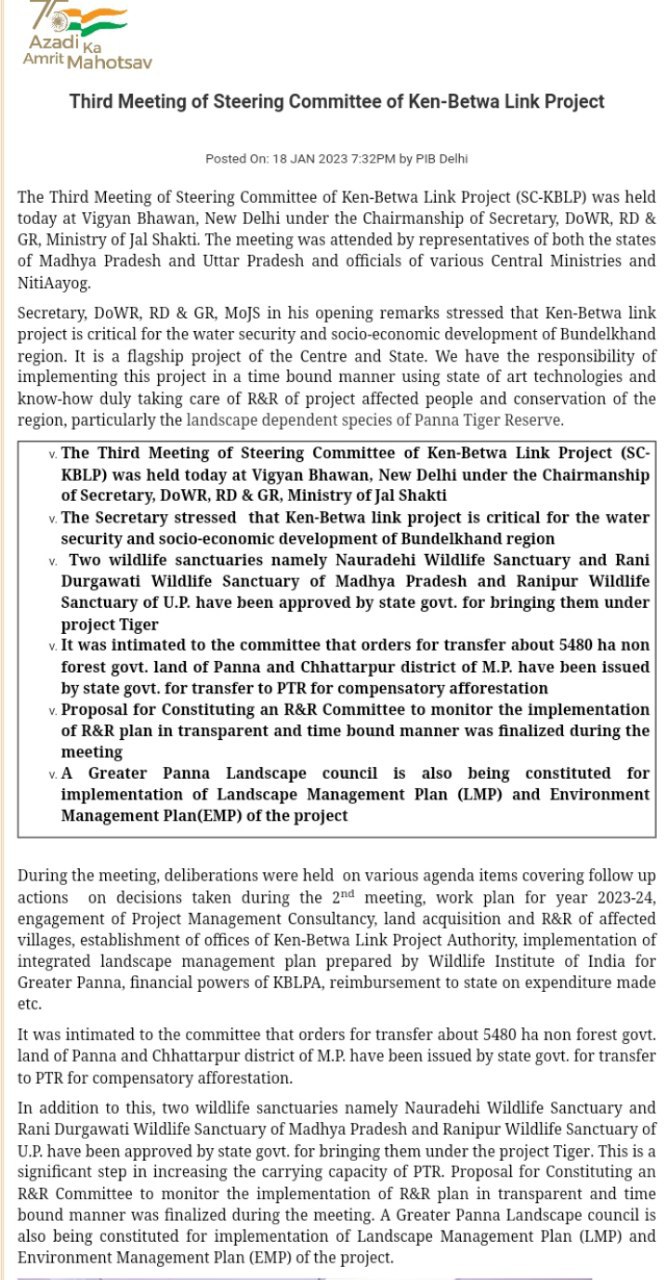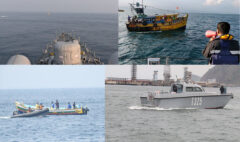Ken-Betwa Link Project
September 21, 2023 2023-09-21 14:18Ken-Betwa Link Project
Ken-Betwa Link Project
✅Under this, the transfer of excess water from the River Ken to the Betwa basin through the use of a concrete canal is proposed.
✅It is the first project under the National Perspective Plan for the interlinking of rivers.
✅It aims to provide irrigation to the Bundelkhand region, which is one of the worst drought-affected areas in India.
✅A Tripartite Memorandum of Understanding was signed between the Centre and the governments of UP and MP for the project.
✅Implementing Agency: A Special Purpose Vehicle (SPV) called Ken-Betwa Link Project Authority (KBLPA) will be set up to implement the project.
✅The National Interlinking of Rivers Authority (NIRA) has the power to set up SPV for individual link projects.


Why in news
✅Chief Ministers of Madhya Pradesh and Uttar Pradesh have signed a historic agreement to implement the Ken Betwa Link Project (KBLP).
✅ Betwa River CLICK HERE
✅ Ken River click here
▪️Benefits of interlinking:
✅Enhances water and food security.
✅Proper utilisation of water.
✅Boost to agriculture.
✅Disaster mitigation.
✅Boost to transportation.
Interstate River water dispute mains Question
Q.Inter-state river water disputes have been among the most pressing issues faced by the Indian federal system. In this context, examine the potential of the Inter-State River Water Disputes (Amendment) Bill, 2019 in addressing the issues involved.
✅Approach:
▪️Briefly introduce the inter-state river water disputes and reasons for it being a pressing issue faced by the Indian federal system.
▪️ Mention the issues associated with the existing Act i.e. Inter-state River Water Dispute Act, 1956
▪️Highlight potential of the Inter-State River Water Disputes (Amendment) Bill, 2019 in dealing with the issues.
▪️Conclude by suggesting other suitable measures that can be undertaken.
🔆Answer:
✅Depleting groundwater, drying rivers, insufficient rainfall and increasing demand for water have led to disputes between states over sharing of river water. It is a pressing issue for the Indian federal system due to:
🔸 Water being a subject in the state list leads to conflicting claims, which act as a detrimental factor against cooperative federalism.
🔸 Politicisation of the issue due to the involvement of the local public leding to the adoption of a hardline approach by political leaders of disputing states and making it an emotive issue.
🔸 Inordinate delay in securing settlement of such disputes as there is no time limit for
adjudication. For example, tribunals for the Cauvery, Ravi and Beas disputes have been in existence for over 26 and 30 years respectively without any award.
🔸 Non-compliance of tribunal awards by States is the critical weak link in dispute resolution
and leads to further enmity between states.
✅The resolution of these disputes is addressed by Article 262 of the Indian Constitution under which the Parliament passed the Inter-State River Water Disputes Act, 1956. It has the following issues:
🔸 Separate tribunal for each Inter-state river water dispute. This further slows down the process due to work on the appointment of judges, assessors and other experts.
🔸 No provision for a piece of adequate machinery to enforce the award of the Tribunal.
🔸Lack of uniform standards, which can be applied in resolving such disputes.
🔸Lack of adequate resources, both physical and human, to objectively assess the facts of the case.
✅The Inter-State River Water Disputes (Amendment) Bill, 2019 has the potential to streamline the adjudication of inter-state river water disputes and make the present legal and institutional architecture robust through the following provisions:
🔸 Dispute Resolution Committee (DRC) to be established by the Central Government before referring to the tribunal, to resolve the dispute amicably by negotiations within one year.
🔸 Establishment of a single Inter-State River Water Dispute Tribunal, which can have multiple benches.
🔸Time limit for a Tribunal to give its decision on the dispute within two years, which may be extended by another year.
🔸The decision of the Tribunal shall be final and binding. The bill removes the requirement of publication of the decision in the official gazette in the original Act.
🔸It makes it mandatory for the Central Government to make a scheme to give effect to the decision of the Tribunal.
🔸 Data collection and maintenance of a databank at the national level for each river basin by an agency to be appointed by the Central government. It will help in the continuous evaluation of the
river basins.
🔸Composition and tenure of members of a tribunal are clearly defined.
✅However, there are fears of over-centralisation and the Supreme Court hearing appeals against the water tribunal rendering the decisions as not final. So, additional measures can be taken such as bringing water to the concurrent list, river-interlinking and use of the Inter-State Council (ISC) in facilitating dialogue and discussion towards resolving conflicts.










Comments (2)
Ken River | ACADEMIA - GROUP OF INSTITUTIONS
[…] Details Click here […]
Betwa River | ACADEMIA - GROUP OF INSTITUTIONS
[…] Details Click Here […]